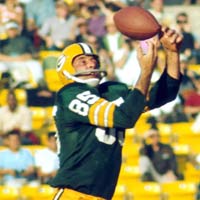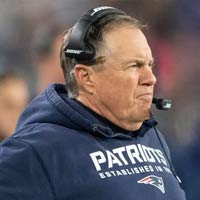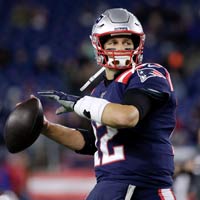The History of the Super Bowl

The modern era of Super Bowl history begins not when the league was founded in 1920, but on January 15th, 1967 when the National Football League (NFL) played the rival American Football League (NFL) in what was originally dubbed the "NFL-AFL Championship Game". That game, and the eventual merger between the two leagues, only came about in SB history because a few disgruntled want-to-be NFL owners got frustrated in 1960 and created the AFL. After coaxing the general public in the direction of supporting a merger, the NFL and AFL agreed to merge in 1966. The agreement between the two leagues stipulated that they merge by 1970, although that elongated timeline still allowed the two leagues to begin playing the 1967 AFL-NFL Championship Game between the NFL's Green Bay Packers and the AFL's Kansas City Chiefs. The Packers won that game 35-10, but what may have been most important was the suggestion by then Chiefs' owner Lamar Hunt's son who suggested the leagues call the game the "Super Bowl". The NFL-AFL Championship Game namesake was then tossed aside for the Super Bowl. The names of the leagues have changed as well once they officially merged in 1970, as the NFL is now the umbrella of which the National Football Conference (NFC) and the American Football Conference (AFC) play. The NFC is made up of the teams that were part of the original National Football League, while the AFC is made up of teams from the American Football League. Of course, a few expansion teams have also been added to both sides since the 1960s.
The AFC-NFC Control of Power
Betting on the Super Bowl started with the Green Bay Packers getting crowned the champion for the first two iterations in the history of the Super Bowl before Joe Namath was able to secure what would eventually become the Lombardi Trophy in 1969. The Jet’s win that season started a four-year run of parity before the Miami Dolphins, Pittsburgh Steelers, and Oakland Raiders would go on to win a combined eight of nine Super Bowls during the 1970s and into 1980. Following that run of AFC dominance, the NFC would go on its own run of dominance as the conference would win 15 of the 16 Super Bowls between 1981 and 1996 on the backs of the San Francisco 49ers and Dallas Cowboys dynasties. Largely due to the sustained excellence of the Tom Brady/Bill Belichick dynasty in New England and the Patrick Mahomes/Andy Reid duo in KC, the record between the conferences is nearly even.
Super Bowl Winning Coaches

There is a proud Super Bowl history of Super Bowl winning coaches. It birthed the legend of Vince Lombardi, for whom the game’s trophy is now named when his Packers won the first two Super Bowl games ever played. It popularized the legend of Chuck Noll’s ‘Steel Curtain’ Pittsburgh Steelers of the 1970s, setting a new standard for defensive excellence. Bill Walsh’s revolutionary ‘West Coast’ passing attack led him to three Super Bowl titles in the 1980s and paved the way for the modern NFL offense. Joe Gibbs became the only coach ever to win Super Bowls with three different starting quarterbacks. In 2007, Tony Dungy became the first black coach to hoist the Lombardi Trophy, followed shortly after by Steelers coach Mike Tomlin in 2009. Bill Belichick earned his record fifth Super Bowl title in 2017 in epic comeback fashion, and added a sixth in 2019.
Super Bowl Winning Quarterbacks

There is a widespread belief in the NFL that elite quarterback play is a prerequisite for a Super Bowl title. That isn’t necessarily true, but the history of the Super Bowl over the years certainly supports that your odds of winning are drastically reduced without great quarterback play. The first eight Super Bowl winning quarterbacks—Bart Starr (twice), Joe Namath, Len Dawson, Johnny Unitas Roger Staubach, Bob Griese, Terry Bradshaw, and Ken Stabler—are all enshrined in the Pro Football Hall of Fame. If you look back at any NFL team with a realistic claim to being a dynasty, you will find a Hall of Fame quarterback at the helm, from Starr to Montana to Brady. There is an inescapable connection between elite quarterback play and Super Bowl success.
Defenses That Won the Super Bowl
The phrase "defense wins championships" has proven to be true throughout Super Bowl history. Few teams in the history of the Super Bowl have won the championship without an above-average scoring Super Bowl defense, with only eight teams ever winning the big game without a scoring defense that was in the top third of all defenses in the key stat. Some of the most famous defenses in the league have been the driving force of many championship teams, with Check Noll's "Steel Curtain" Steelers and the '85 Bears two of the most well-known defenses to do so. Many of the teams to win the Super Bowl since 2000 have also featured vaunted defenses, such as the 2000 Ravens, the 2002 Buccaneers, and the "Legion of Boom" Seattle Seahawks in 2014. Defense has proved vital specifically over the past nine seasons, as the Cincinnati Bengals 20 points marked the sixth time that the runner-up finished with 20 or fewer points. With that said, over the same time frame, there have been as many teams to score more than 20 points as there have been that have scored less than 10 points (3). The NFL may be a "quarterback-driven league" but the adage that "defense wins championships" continues to be nearly as important.
Past Super Bowl Scores And Results
| Date | Super Bowl | Result | MVP |
|---|---|---|---|
| Feb. 11th, 2024 | LVIII | Kansas City 25, San Francisco 22 | Patrick Mahomes |
| Feb. 12th, 2023 | LVII | Kansas City 38, Philadelphia 35 | Patrick Mahomes |
| Feb. 13th, 2022 | LVI | Los Angeles Rams 23, Cincinnati 20 | Cooper Kupp |
| Feb. 7, 2021 | LV | Tampa Bay 31, Kansas City 9 | Tom Brady |
| Feb. 2, 2020 | LIV | Kansas City 31, San Francisco 20 | Patrick Mahomes |
| Feb. 3, 2019 | LIII | New England 13, Los Angeles Rams 3 | Julian Edelman |
| Feb. 4, 2018 | LII | Philadelphia 41, New England 33 | Nick Foles |
| Feb. 5, 2017 | LI | New England 34, Atlanta 28 (OT) | Tom Brady |
| Feb. 7, 2016 | 50 | Denver 24, Carolina 10 | Von Miller |
| Feb. 1, 2015 | XLIX | New England 28, Seattle 24 | Tom Brady |
| Feb. 2, 2014 | XLVIII | Seattle 43, Denver 8 | Malcolm Smith |
| Feb. 3, 2013 | XLVII | Baltimore 34, San Francisco 31 | Joe Flacco |
| Feb. 5, 2012 | XLVI | Giants 21, New England 17 | Eli Manning |
| Feb. 6, 2011 | XLV | Green Bay 31, Pittsburgh 25 | Aaron Rodgers |
| Feb. 7, 2010 | XLIV | New Orleans 31, Indianapolis 17 | Drew Brees |
| Feb. 1, 2009 | XLIII | Pittsburgh 27, Arizona 23 | Santonio Holmes |
| Feb. 3, 2008 | XLII | Giants 17, New England 14 | Eli Manning |
| Feb. 4, 2007 | XLI | Indianapolis 29, Chicago 17 | Peyton Manning |
| Feb. 5, 2006 | XL | Pittsburgh 21, Seattle 10 | Hines Ward |
| Feb. 6, 2005 | XXXIX | New England 24, Philadelphia 21 | Deion Branch |
| Feb. 1, 2004 | XXXVIII | New England 32, Carolina 29 | Tom Brady |
| Jan. 26, 2003 | XXXVII | Tampa Bay 48, Oakland 21 | Dexter Jackson |
| Feb. 3, 2002 | XXXVI | New England 20, St. Louis 17 | Tom Brady |
| Jan. 28, 2001 | XXXV | Baltimore 34, Giants 7 | Ray Lewis |
| Jan. 30, 2000 | XXXIV | St. Louis 23, Tennessee 16 | Kurt Warner |
| Jan. 31, 1999 | XXXIII | Denver 34, Atlanta 19 | John Elway |
| Jan. 25, 1998 | XXXII | Denver 31, Green Bay 24 | Terrell Davis |
| Jan. 26, 1997 | XXXI | Green Bay 35, New England 21 | Desmond Howard |
| Jan. 28, 1996 | XXX | Dallas 27, Pittsburgh 17 | Larry Brown |
| Jan. 29, 1995 | XXIX | San Francisco 49, San Diego 26 | Steve Young |
| Jan. 30, 1994 | XXVIII | Dallas 30, Buffalo 13 | Emmitt Smith |
| Jan. 31, 1993 | XXVII | Dallas 52, Buffalo 17 | Troy Aikman |
| Jan. 26, 1992 | XXVI | Washington 37, Buffalo 24 | Mark Rypien |
| Jan. 27, 1991 | XXV | New York Giants 20, Buffalo 19 | Ottis Anderson |
| Jan. 28, 1990 | XXIV | San Francisco 55, Denver 10 | Joe Montana |
| Jan. 22, 1989 | XXIII | San Francisco 20, Cincinnati 16 | Jerry Rice |
| Jan. 31, 1988 | XXII | Washington 42, Denver 10 | Doug Williams |
| Jan. 25, 1987 | XXI | New York Giants 39, Denver 20 | Phil Simms |
| Jan. 26, 1986 | XX | Chicago 46, New England 10 | Richard Dent |
| Jan. 20, 1985 | XIX | San Francisco 38, Miami 16 | Joe Montana |
| Jan. 22, 1984 | XVIII | Los Angeles 38, Washington 9 | Marcus Allen |
| Jan. 30, 1983 | XVII | Washington 27, Miami 17 | John Riggins |
| Jan. 24, 1982 | XVI | San Francisco 26, Cincinnati 21 | Joe Montana |
| Jan. 25, 1981 | XV | Oakland 27, Philadelphia 10 | Jim Plunkett |
| Jan. 20, 1980 | XIV | Pittsburgh 31, Los Angeles 19 | Terry Bradshaw |
| Jan. 21, 1979 | XIII | Pittsburgh 35, Dallas 31 | Terry Bradshaw |
| Jan. 15, 1978 | XII | Dallas 27, Denver 10 H. Martin, | R. White |
| Jan. 9, 1977 | XI | Oakland 32, Minnesota 14 | Fred Biletnikoff |
| Jan. 18, 1976 | X | Pittsburgh 21, Dallas 17 | Lynn Swann |
| Jan. 12, 1975 | IX | Pittsburgh 16, Minnesota 6 | Franco Harris |
| Jan. 13, 1974 | VIII | Miami 24, Minnesota 7 | Larry Csonka |
| Jan. 14, 1973 | VII | Miami 14, Washington 7 | Jake Scott |
| Jan. 16, 1972 | VI | Dallas 24, Miami 3 | Roger Staubach |
| Jan. 17, 1971 | V | Baltimore 16, Dallas 13 | Chuck Howley |
| Jan. 11, 1970 | IV | Kansas City 23, Minnesota 7 | Len Dawson |
| Jan. 12, 1969 | III | Jets 16, Baltimore 7 | Joe Namath |
| Jan. 14, 1968 | II | Green Bay 33, Oakland 14 | Bart Starr |
| Jan. 15, 1967 | I | Green Bay 35, Kansas City 10 | Bart Starr |





